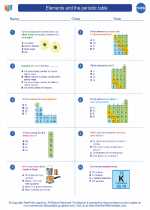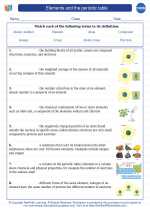Grains in Chemistry
Grains are an important concept in chemistry, particularly in the study of solids and crystalline structures. In chemistry, a grain refers to the individual crystalline units within a solid material, such as a metal or a mineral. Understanding the arrangement and properties of grains is crucial in materials science, metallurgy, and various other fields of chemistry.
Structure of Grains
At the atomic level, grains are made up of a three-dimensional arrangement of atoms or molecules. These arrangements can vary widely in their size, shape, and orientation, and they can have a significant impact on the properties of the material as a whole. The study of grain structure involves analyzing the size and shape of individual grains, as well as their boundaries and the way they are packed together within the material.
Properties of Grains
The properties of a material's grains can influence its mechanical, thermal, and electrical behavior. For example, in metals, the size and orientation of grains can affect the material's strength, ductility, and conductivity. In ceramics and semiconductors, the arrangement of grains can determine properties such as hardness, brittleness, and dielectric strength.
Techniques for Studying Grains
Chemists and materials scientists use a variety of techniques to study the grains within a material. These techniques include:
- X-ray diffraction: This method can be used to determine the size and orientation of grains within a crystalline material.
- Electron microscopy: High-resolution imaging techniques can reveal the shape and arrangement of grains at the nanoscale.
- Grain boundary engineering: This approach involves manipulating the grain boundaries in a material to enhance its properties, such as increasing its strength or corrosion resistance.
Importance of Grains
Understanding the structure and properties of grains is critical for designing new materials with specific characteristics and for improving the performance of existing materials. By controlling the size, shape, and orientation of grains, scientists and engineers can develop materials with tailored properties for a wide range of applications, from structural components in buildings and vehicles to electronic devices and medical implants.
Study Guide for Grains in Chemistry
To effectively study the concept of grains in chemistry, consider the following steps:
- Understand the basic principles of crystallography and the arrangement of atoms in crystalline materials.
- Learn about the different types of grain boundaries and their effects on material properties.
- Explore the techniques used to analyze and manipulate grain structures, such as electron microscopy and grain boundary engineering.
- Examine real-world examples of how grain structure impacts the properties of materials, from metals and ceramics to polymers and composites.
- Consider the role of grains in emerging fields such as nanotechnology and additive manufacturing, and how they influence the design and performance of advanced materials.
By mastering the concept of grains in chemistry, you will gain valuable insights into the behavior and characteristics of solids, and you will be better equipped to contribute to the development of innovative materials and technologies.
.◂Chemistry Worksheets and Study Guides High School. Elements and the periodic table

 Worksheet/Answer key
Worksheet/Answer key
 Worksheet/Answer key
Worksheet/Answer key
 Vocabulary/Answer key
Vocabulary/Answer key
 Vocabulary/Answer key
Vocabulary/Answer key
 Vocabulary/Answer key
Vocabulary/Answer key
